The Foundation Board has chosen the ukrainian writer and musician Serhiy Zhadan as the Peace Prize winner of the year 2022. The award ceremony took place on Sunday, 23 October 2022, in Frankfurt's Paulskirche. The laudation was held by Sasha Marianna Salzmann.
Statement of the Jury
The German Publishers and Booksellers Association awards the 2022 Peace Prize of the German Book Trade to Serhiy Zhadan. We honour this Ukrainian author and musician for his outstanding artistic work as well as for his unequivocal humanitarian stance, which repeatedly motivates him to risk his own life to help people affected by war and thus to call greater attention to their plight.
In his novels, essays, poems and lyrics, Serhiy Zhadan introduces us to a world that has experienced radical change yet continues to live on tradition. His stories illustrate how war and destruction enter into this world and turn people’s lives upside down. Throughout his entire oeuvre, he uses a unique language that provides us with a vivid and differentiated portrait of the reality that many of us chose to disregard for far too long.
Thoughtfully and with the precision of a true listener, in a poetic and radical tone, Serhiy Zhadan reveals how the people of Ukraine defy the violence around them, striving instead to lead independent lives rooted in peace and freedom.
Speeches
Thank you for undertaking the long journey, away from your fellow citizens whom you care for and on whose behalf you are tirelessly active – at the risk of your own life! Thank you for your novels, your poetry, your music. And thank you for your testimony. For bearing witness to war. Thank you, Serhiy Zhadan
Karin Schmidt-Friderichs - Greeting
In an era where words, positions and judgements chafe us to the bone, this poet draws on a posture of radical humanity to create moments in which we can simply breathe.
Sasha Marianna Salzmann - Laudation
As long as we have our language, we have, at the very least, the vague chance to articulate ourselves, speak the truth, and tidy up our memories. So we speak and we go on speaking.
Serhiy Zhadan - Acceptance Speech
Biography
Serhiy Zhadan is a novelist, poet, translator and musician who was born on 23 August 1974 in Starobilsk, Luhansk Oblast, in the former Soviet Republic of Ukraine. He is one of the most important, innovative and best-known voices in contemporary Ukrainian literature. His multifaceted literary oeuvre comprises novels, poems, short stories, reportages and essays devoted in particular to the period of time from the collapse of the Soviet Union to the war that has been raging in Ukraine since 2014. Zhadan sets his stories primarily in the city of Kharkiv and in eastern Ukraine; these are also areas where he is socially and culturally active and where he has provided humanitarian aid throughout the current conflict. Even though he grew up in a predominantly Russian-speaking environment, Zhadan writes in Ukrainian. His books have been translated into numerous languages and won a number of international prizes. On 23 October 2022 he will receive the Peace Prize of the German Book Trade.
Serhiy Zhadan studied literature, Ukrainian studies and German studies at university in Kharkiv, the second largest city in Ukraine. In 1996, he received his doctorate with a thesis on Ukrainian Futurism. After initially working as a lecturer at university, he then began to work as a freelance writer. In the early 1990s, he published his first poems and started organising literary and music festivals, thereby influencing the city’s cultural scene. In several of his early literary works – for example, in his debut novel »Depeche Mode« (Ukrainian edition, 2004; English edition, 2013) – he explores the national and personal upheavals associated with the post-Soviet era and illustrates the efforts of people in Ukraine to come to terms with their new circumstances. His third novel, the German title of which is »Die Erfindung des Jazz im Donbass« (tr. The invention of jazz in Donbas; Ukrainian edition, 2010; German edition, 2012), boasts an anarchic narrative style and functions as a kind of ‘road novel’ through the Donbas industrial region, to which the author lends surreal elements and a poetical charge. With this fantastical landscape as a backdrop, the novel’s protagonist sets out on a quest to find some kind of home in a world of increasingly dissolving frontiers. In 2014, the Ukrainian BBC chose this work as its »Book of the Decade«.
In his novel »Mesopotamien« (Ukrainian edition, 2014; German edition, 2015), Zhadan uses a mixture of prose and poetry to portray his hometown of Kharkiv, which is depicted as a modern-day Babylon. Two bodies of water divide the “land of the two rivers” into an upper and lower city. While war and violence rage on, the people of the city struggle to survive, driven by their longing for love, a sentiment they use as a means to defy hopelessness and death.
Zhadan’s most recent novel »The Orphanage« (Ukrainian edition, 2017; English edition, 2021) – the German translation of which (»Internat«, 2018) was awarded the top prize for translation at the Leipzig Book Fair that year – takes readers to the war in Donbas. The main character is a teacher who must travel through the war zone to pick up his nephew from boarding school. His journey leads him through an apocalyptic setting, and in the dense fog he repeatedly gets caught between the front lines, where he is ultimately confronted with the question of whether a person can remain neutral in times of war.
In his poems and short stories – from the collection of poetry »Die Geschichte der Kultur zu Anfang des Jahrhunderts« (Ukrainian edition, 2003; German edition, 2006) and »Hymne der demokratischen Jugend. Erzählungen« (Ukrainian edition, 2006; German edition, 2009) to the sensitive poems of »Antenne« (Ukrainian edition, 2018; German edition, 2020) – Serhiy Zhadan exhibits a polyphony of voices and demonstrates his proximity to the world of music. This is where punk meets poetry. Still, the focus is always on people, especially on so-called underdogs, that is, on those people who initially appear unremarkable in terms of their individuality and difference. Critics have heaped equal amounts of praise on the author’s concrete and articulate form of expression as on his sometimes ironic tone and documentary-like accuracy.
*
In addition to his work as a writer, Zhadan has also translated poetry from German, English, Belarusian and Russian into Ukrainian, including poems by Paul Celan and Charles Bukowski. He also writes lyrics for various rock bands, including »Zhadan & Sobaki« (»Zhadan an the Dogs«), for which he’s been the lead singer since 2007. After the Russian annexation of the Crimean Peninsula in 2014 and the occupation of Donbas, Zhadan travelled with the band through the Ukrainian war zone and played concerts for the soldiers. In 2004, he was active in the Orange Revolution and in 2013 supported the nationwide Maidan protests as well as the pro-European movement. After the outbreak of the war in 2014, he helped organise humanitarian aid shipments to eastern Ukraine. He also initiated a project that provides books to libraries in the Donetsk and Luhansk regions. In 2017, he launched the Serhiy Zhadan Charitable Foundation, which works to support educational and cultural initiatives in that part of the country.
Even after the start of the Russian war of aggression against Ukraine in 2022, Zhadan continued his cultural activism and humanitarian aid: he still lives in Kharkiv, plays concerts in subway stations, helps civilians escape gunfire and shelling, gives poetry readings and distributes aid in the city. His first-hand reports on the situation in Ukraine have been translated into several languages and provide up-to-the-minute documents on how those affected seek to go about their daily lives in the face of violence and threats.
Awards
2022 Peace Prize of the German Book Trade
2022 Hannah Arendt Prize, Bremen
2022 Freedom Prize of the Frank Schirrmacher Foundation
2022 EBRD Literature Prize (together with translators Reilly Costigan-Humes and Isaac Stackhouse Wheeler)
2018 Prize of the Leipzig Book Fair for the German translators Juri Durkot and Sabine Stöhr for “Internat” (“The Orphanage” in English)
2017 Vasyl Stus Prize
2015 Angelus Central European Literature Award
2014 Brücke Berlin Award for Literature and Translation
2014 Jan Michalski Prize for Literature
2009 Joseph Conrad-Korzeniowski Literary Prize
2006 Hubert Burda Prize for Poetry
2002 Samuel Bogumil Linde Literature Prize
Bibliography
English
»The Orphanage: A Novel«
translated by Reilly Costigan Humes and Isaac Stackhouse Wheeler Yale University Press, New Haven 2021, ISBN 9780300243017
»A new orthography. Poems«
Lost Horse Press, Sandpoint, Idaho 2020, ISBN 9781733340038
»What We Live For, What We Die For: Selected Poems«
translated by Viralna Tkacz and Wanda Phipps Yale University Press, New Haven 2019, ISBN 9780300223361
»Mesopotamia«
translated by Reilly Costigan-Humes & Isaac Stackhouse, wheele poetry translated by Viralna Tkacz and Wanda Phipps Yale University Press, New Haven 2018, ISBN 9780300223354
»Voroshilovgrad«
translated by Isaac Stackhouse Wheeler and Reilly Costigan-Humes Deep Velum, Dallas 2016, ISBN 9781941920305
»Depeche Mode«
translated by Miroslav Shkandrij Glagoslav Publications, London 2013, ISBN 9781909156883
German
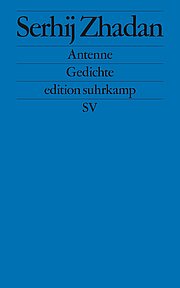
»Antenne. Gedichte«
Aus dem Ukrainischen von Claudia Dathe Suhrkamp Verlag, Berlin 2020 (Orig. 2018), 144 Seiten, ISBN 978-3-518-12752-0, 14,00 €
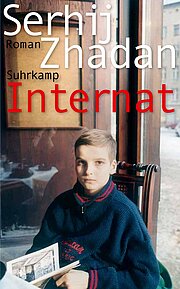
»Internat. Roman«
Aus dem Ukrainischen von Juri Durkot und Sabine Stöhr Suhrkamp Verlag, Berlin 2018 (4. Aufl. 2022, Orig. 2017), 300 Seiten, ISBN 978-3-518-42805-4, 22,00 €
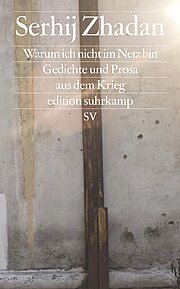
»Warum ich nicht im Netz bin. Gedichte und Prosa aus dem Krieg«
Aus dem Ukrainischen von Claudia Dathe Suhrkamp Verlag, Berlin 2016 (2. Aufl. 2022), 180 Seiten, ISBN 978-3-518-07287-5, 16,00 €
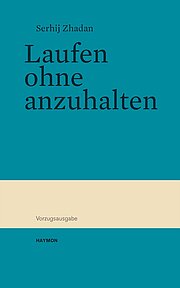
»Laufen ohne anzuhalten. Erzählung«
Aus dem Ukrainischen von Sabine Stöhr Haymon Verlag, Innsbruck 2016 (2. Aufl. 2022), 28 Seiten, ISBN 978-3-7099-7263-2, 16,90 €

»Mesopotamien. Roman«
Aus dem Ukrainischen von Claudia Dathe, Juri Durkot und Sabine Stöhr Suhrkamp Verlag, Berlin 2015 (3. Aufl. 2022, Orig. 2014), 362 Seiten, ISBN 978-3-518-42504-6, 22,95 €
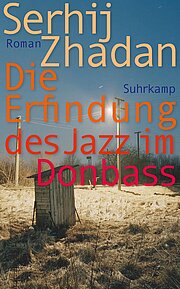
»Die Erfindung des Jazz im Donbass. Roman«
Aus dem Ukrainischen von Juri Durkot und Sabine Stöhr Suhrkamp Verlag, Berlin 2012 (4. Aufl. 2022, Orig. 2010), 394 Seiten, ISBN 978-3-518-42335-6, 24,00 €
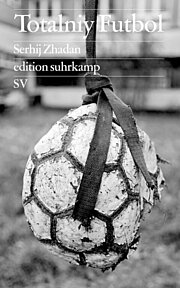
»Totalniy Futbol. Eine polnisch-ukrainische Fußballreise«
Aus dem Ukrainischen von Lisa Palmes, Sabine Stöhr und anderen herausgegeben von Serhij Zhadan mit einem Fotoessay von Kirill Golovchenko. Suhrkamp Verlag, Berlin 2012, 242 Seiten, ISBN 9783518062166, 18,00 €
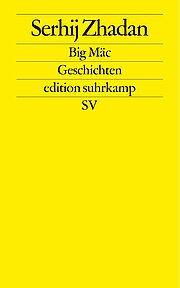
»Big Mäc. Geschichten«
Aus dem Ukrainischen von Claudia Dathe Suhrkamp Verlag, Berlin 2011 (Orig. 2011), 227 Seiten, ISBN 978-3-518-79670-2, 14,00 €
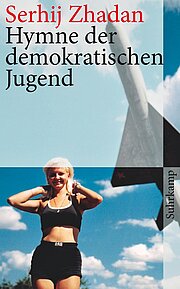
»Hymne der demokratischen Jugend. Erzählungen«
Aus dem Ukrainischen von Juri Durkot und Sabine Stöhr Suhrkamp Verlag, Frankfurt am Main 2009 (2. Aufl. 2011, Orig.2006), 185 Seiten, ISBN 978-3-518-46217-1, 10,00 €
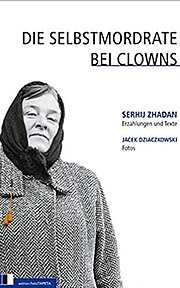
»Die Selbstmordrate bei Clowns. Erzählungen«
Aus dem Ukrainischen von Claudia Dathe Mit Fotografien Jacek von Dziaczkowski Edition FotoTapeta, Berlin, Warschau 2009 (2. Aufl.), 192 Seiten, ISBN 978-3-940524-04-1, 19,80 €
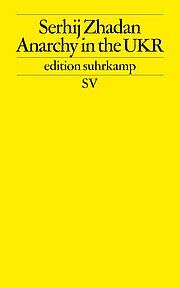
»Anarchy in the UKR. Roman«
Aus dem Ukrainischen von Juri Durkot und Sabine Stöhr Suhrkamp Verlag, Frankfurt am Main 2007 (2. Aufl. 2016, Orig. 2005), 217 Seiten, ISBN 978-3-518-12522-9, 12,00 €
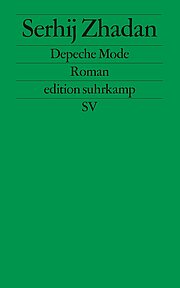
»Depeche Mode. Roman«
Aus dem Ukrainischen von Juri Durkot und Sabine Stöhr Suhrkamp Verlag, Frankfurt am Main 2007 (4. Aufl. 2022, Orig. 2004), 246 Seiten, ISBN 978-3-518-12494-9, 18,00 €
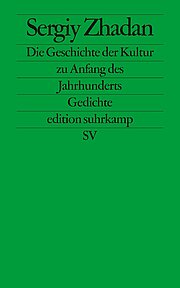
»Die Geschichte der Kultur zu Anfang des Jahrhunderts. Gedichte«
Aus dem Ukrainischen von Claudia Dathe Suhrkamp Verlag, Frankfurt am Main 2006 (Orig. 2003), 96 Seiten, ISBN 978-3-518-12455-0, 9,00 €
Laudation Sasha Marianna Salzmann
Sasha Marianna Salzmann, born in 1985 in Volgograd (Russia), grew up in Moscow and came to Germany in 1995. Salzmann studied literature, theatre and media in Hildesheim and scenic writing at the Berlin University of the Arts. In 2002, Salzmann was one of the co-founders of the culture and society magazine “freitext” and co-edited it for eleven years. In 2013 Salzmann became an in-house writer at the Maxim Gorki Theater Berlin and in the same year took over the artistic direction of STUDIO Я until 2015. Together with Max Czollek, Salzmann initiated as curators the Disintegration Congress in 2016 and the Radical Jewish Culture Days at the Maxim Gorki Theater in 2017. In 2017/2018, Salzmann was also part of the leadership team of the literary workshop "War in Peace" at the Literary Colloquium Berlin.
Salzmann's debut novel "Außer sich" (Suhrkamp Verlag) was shortlisted for the German Book Prize 2017. It tells the story of Alissa, who embarks on a search in Istanbul's queer scene and in her own family history: for her missing twin brother and for her belonging beyond origin, mother tongue or gender. Salzmann's second novel, "Im Menschen muss alles herrlich sein", published in 2021 and again nominated for the German Book Prize, is set in the late, disintegrating Soviet Union, in Ukraine during the perestroika years, and in present-day Germany. It deals with the indissoluble entanglement of two generations of women across political upheavals and emigration.
In her own work, Salzmann repeatedly refers to the texts of Serhiy Zhadan, who is one of the author's literary examples.
The two novels as well as Salzmann's internationally performed plays have received several awards, including the Mara Cassens Prize (2017), the Nestroy Theatre Prize (2018) and the Berlin Art Prize (2020). In 2020, the author received the Ricarda Huch Poetics Lectureship for "Gender in the Literary World", and in 2022 the Prize of the Houses of Literature.